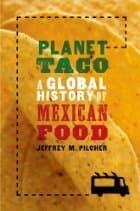
Book Review Summary: Planet Taco: A Global History of Mexican Food
Introduction
Planet Taco: A Global History of Mexican Food by Jeffrey M. Pilcher is a scholarly exploration of Mexican food that delves into its rich history and the various influences that have shaped it. From the origins of corn and the impact of colonialism to the globalization of Mexican cuisine, this book offers a comprehensive and engaging look at the complex relationship between food, culture, and identity.
About Jeffrey M. Pilcher
Jeffrey M. Pilcher, the author of Planet Taco, is a professor of history at the University of California, Davis. With a background in Mexican history and food studies, Pilcher brings a unique perspective to the subject matter, offering readers a deep understanding of the historical context behind Mexican food.
Analysis of Views
- Historical Depth: Readers appreciate the depth of research and historical context provided by Pilcher in Planet Taco. The book covers a wide range of topics, from the origins of corn and the impact of colonialism to the globalization of Mexican cuisine. This comprehensive exploration of Mexican food history is a major draw for readers interested in understanding the subject in its entirety.
- Engaging Writing Style: Many readers find Pilcher's writing style engaging and accessible. Despite the book's academic nature, Pilcher manages to present complex ideas in a way that is easy to understand and enjoyable to read. This makes Planet Taco a great choice for both academic researchers and general readers interested in food history.
- Interdisciplinary Approach: The book takes an interdisciplinary approach, incorporating elements of history, sociology, anthropology, and cultural studies. This broad scope allows readers to gain a deeper understanding of the various factors that have influenced Mexican food, including politics, economics, geography, and social and racial consequences.
- Relevance to Modern Issues: Many readers appreciate how Pilcher connects the history of Mexican food to current political and economic issues. By examining the impact of NAFTA, immigration, and globalization on Mexican cuisine, Pilcher provides valuable insights into the complex relationship between food, culture, and politics in contemporary times.
- Visual Aids: The inclusion of photographs, maps, and recipes in Planet Taco enhances the reading experience for many readers. These visual aids help to illustrate the concepts discussed in the book and provide a tangible connection to the subject matter.
Reasons for Recommendation
- Comprehensive Exploration: Planet Taco offers a comprehensive exploration of Mexican food history that covers a wide range of topics, from the origins of corn to the globalization of Mexican cuisine. This breadth makes it a valuable resource for anyone interested in understanding the complex relationship between food, culture, and identity in Mexico.
- Engaging Writing Style: Pilcher's engaging writing style makes the book accessible to readers with varying levels of expertise. Whether you're a food enthusiast or an academic researcher, you'll find Pilcher's writing style both informative and enjoyable to read.
- Interdisciplinary Approach: The interdisciplinary approach taken by Pilcher allows readers to gain insights into various factors that have influenced Mexican food, including politics, economics, geography, and social and racial consequences. This holistic perspective enriches the understanding of the subject matter.
- Relevance to Modern Issues: By connecting historical events to current political and economic issues, Pilcher provides valuable insights into the complex relationship between food, culture, and politics in contemporary times. This relevance makes Planet Taco a timely and relevant read for those interested in understanding the broader implications of globalization on cultural identity.
- Visual Aids: The inclusion of photographs, maps, and recipes adds depth to the book and helps readers visualize the concepts discussed. These visual aids enhance the overall reading experience and provide a tangible connection to the subject matter.
Reasons for Not Recommendation
- Density of Information: Some readers find Planet Taco dense with information, which may make it challenging to read through at times. While this depth is appreciated by those interested in a comprehensive exploration of Mexican food history, it may be overwhelming for those seeking a more accessible read.
- Limited Focus on Culinary Experience: While Planet Taco provides valuable insights into the historical context behind Mexican cuisine, some readers feel that it lacks a focus on the culinary experience itself. They would have appreciated more detailed descriptions of flavors, textures, and cooking techniques associated with various dishes mentioned in the book.
Conclusion
Planet Taco: A Global History of Mexican Food by Jeffrey M. Pilcher is a comprehensive exploration of Mexican food history that delves into its origins, influences, and global impact. With its engaging writing style, interdisciplinary approach, relevance to modern issues, and visual aids, this book offers readers a deep understanding of the complex relationship between food, culture, and identity in Mexico. While some readers find it dense with information or lacking in a focus on culinary experience, overall, Planet Taco is highly recommended for those interested in food history, cultural studies, and the broader implications of globalization on cultural identity.